
Airbus needs China's blessing on its newest jetliners. And without it, undelivered planes are piling up at its factories in France and Germany.
The company wanted to sell nearly 200 more Airbus jets to China this week. But Chinese airlines have yet to take delivery of many airliners they've ordered from the company even though the planes are built.
That's because China's aviation regulator has yet to allow deliveries of key Airbus (EADSF) models.
Across Airbus's factories in Germany and France, more than a dozen A320neo and A321neos, some that were ready as far back as last spring, have been in storage awaiting final sign-offs from the Civil Aviation Administration of China. About a half-dozen A350s for Chinese carriers are waiting at its main headquarters in Toulouse in southern France.
Winning regulatory approval in China, the world's largest airplane market over the next two decades, is crucial as Airbus and Boeing (BA) pin their future hopes on China.
Precisely what has slowed Airbus' approvals in China isn't entirely clear. The delays have more to do with politics than technology, say several people familiar with the regulatory delays. The delays are wrapped up in an extended wish list from Beijing that ranges from new safety agreements with Europe to additional production in China.
This is business diplomacy at work, said Richard Aboulafia, vice president of analysis at the Teal Group aerospace consultancy.
"Jetliner purchases are a continuation of politics by any other means," Aboulafia said. China's ascendant role in aerospace as both competitor and customer gives them unique leverage over Boeing and Airbus. "Their actual buying clout greatly exceeds their market size."
And Airbus is clearly making an effort to please the Chinese government.
During a visit this week by French President Emmanuel Macron with Chinese President Xi Jinping, the European planemaker announced it would increase production at its final assembly line in the Chinese city of Tianjin from four A320 jets each month to six by 2020. Airbus has even floated the idea of a new industrial partnership with China on the world's biggest jetliner, the A380. Orders are badly needed on that program.
Airbus Chief Operating Officer Fabrice Brégier met during a visit to Beijing in late October with CAAC director Feng Zhenglin to discuss Airbus's business operations in China, including aircraft airworthiness certification. An Airbus spokesman declined to say if the outstanding certification of Airbus's newest jets was discussed.
Neither the CAAC nor the Chinese Ministry of Foreign Affairs responded to a request for comment about certification delays.
Delta set to place huge order with Airbus
Airbus disputed the idea that political issues are affecting the pace of Chinese approvals.
"This is a technical validation process ... not a political one," a spokesman for the company said. "The number of aircraft is small, and these will be delivered in the short term."
China's aviation regulator is considered one of the most methodical and rigorous on the planet. But in the Chinese aerospace industry, much of what happens is linked to the country's long-term ambitions to compete against Boeing and Airbus.
"The Chinese are pretty good in building pressure on certain desires they have," said one senior Airbus official. "The Chinese are playing it slow on granting [certification] on any aircraft program, be it Boeing or Airbus."
Only in the closing days of last year was Airbus awarded Chinese certification for its new A321neo with Pratt & Whitney engines, the company said. That approval came nearly a year after many of the planes on order had already been made. Both A320neo and A321neo jets with CFM International engines have yet to win Chinese approval.
It's common practice in the airplane business to add more orders even when previous commitments haven't been fulfilled. Chinese carriers took delivery of 424 airliners from Airbus and Boeing and other manufacturers in 2017, according to trade publication Air Transport World.
Getting approval from the Chinese regulator has often come closely times around political visits that accompany other deals. Boeing won Chinese certification for its single-aisle 737 Max in mid-October, just before a visit to the country by President Trump in November.
Trump & Boeing: It's not about Air Force One, it's about China
The U.S. and China also signed a new aviation safety agreement last fall after more than 10 years of negotiations.
The Federal Aviation Administration denied there was any connection around the bilateral agreement and timing of aircraft certification.
China is in the middle of finalizing a new bilateral aviation safety agreement with Europe that would recognize China's airworthiness standards. That would provide a major boost to Chinese plane makers and suppliers, who want to eventually sell Chinese-made airliners in Europe.
China's first direct competitor to Boeing and Airbus's dominant single-aisle jets, the Comac C919, made its first test flight in May 2017.
China over the years has asked Airbus to intervene with the European Aviation Safety Agency and the European Commission to help expedite the talks over the aviation safety agreement, say two people familiar with the requests. As the negotiations dragged on, so did the pace of certification.
The talks between China and the European Commission were successfully completed in December, according to a European Commission spokesman.
The agreement is expected to be signed in June, which the Commission says it expects will help advance certification for "European aviation products" in China.

